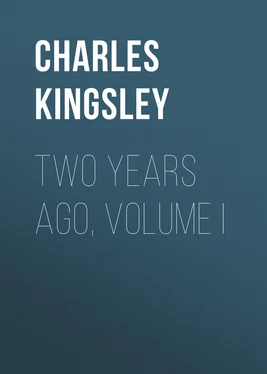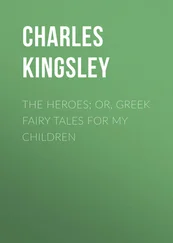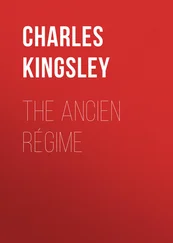Charles Kingsley - Two Years Ago, Volume I
Здесь есть возможность читать онлайн «Charles Kingsley - Two Years Ago, Volume I» — ознакомительный отрывок электронной книги совершенно бесплатно, а после прочтения отрывка купить полную версию. В некоторых случаях можно слушать аудио, скачать через торрент в формате fb2 и присутствует краткое содержание. Жанр: foreign_prose, literature_19, foreign_antique, на английском языке. Описание произведения, (предисловие) а так же отзывы посетителей доступны на портале библиотеки ЛибКат.
- Название:Two Years Ago, Volume I
- Автор:
- Жанр:
- Год:неизвестен
- ISBN:нет данных
- Рейтинг книги:5 / 5. Голосов: 1
-
Избранное:Добавить в избранное
- Отзывы:
-
Ваша оценка:
- 100
- 1
- 2
- 3
- 4
- 5
Two Years Ago, Volume I: краткое содержание, описание и аннотация
Предлагаем к чтению аннотацию, описание, краткое содержание или предисловие (зависит от того, что написал сам автор книги «Two Years Ago, Volume I»). Если вы не нашли необходимую информацию о книге — напишите в комментариях, мы постараемся отыскать её.
Two Years Ago, Volume I — читать онлайн ознакомительный отрывок
Ниже представлен текст книги, разбитый по страницам. Система сохранения места последней прочитанной страницы, позволяет с удобством читать онлайн бесплатно книгу «Two Years Ago, Volume I», без необходимости каждый раз заново искать на чём Вы остановились. Поставьте закладку, и сможете в любой момент перейти на страницу, на которой закончили чтение.
Интервал:
Закладка:
Upon a man so hard and strong this fearful blow had fallen, and, to do him justice, he took it like a man. He wandered on and on for an hour or more, up the hills, and into the forest, talking to himself.
"Poor old Willy! I should have liked to have looked into his honest face before he went, if only to make sure that we were good friends. I used to plague him sadly with my tricks. But what is the use of wishing for what cannot be? I recollect I had just the same feeling when John died; and yet I got over it after a time, and was as cheerful as if he were alive again, or had never lived at all. And so I shall get over this. Why should I give way to what I know will pass, and is meant to pass? It is my father I feel for. But I couldn't be there; and it is no fault of mine that I was not there. No one told me what was going to happen; and no one could know: so again,—why grieve over what can't be helped?"
And then, to give the lie to all his cool arguments, he sat down among the fern, and burst into a violent fit of crying. "Oh, my poor dear old daddy!"
Yes; beneath all the hard crust of years, that fountain of life still lay pure as when it came down from heaven—love for his father.
"Come, come, this won't do; this is not the way to take stock of my goods, either mental or worldly. I can't cry the dear old man out of this scrape."
He looked up. The sun was setting. Beneath the dark roof of evergreens the eucalyptus boles stood out, like basalt pillars, black against a background of burning flame. The flying foxes shot from tree to tree, and moths as big as sparrows whirred about the trunks, one moment black against the glare beyond, and vanishing the next, like imps of darkness, into their native gloom. There was no sound of living thing around, save the ghastly rattle of the dead bark-tassels which swung from every tree, and far away, the faint clicking of the diggers at their work, like the rustle of a gigantic ant-hill. Was there one among them all who cared for him? who would not forget him in a week with—"Well, he was pleasant company, poor fellow," and go on digging without a sigh? What, if it were his fate to die, as he had seen many a stronger man, there in that lonely wilderness, and sleep for ever, unhonoured and unknown, beneath that awful forest roof, while his father looked for bread to others' hands?
No man was less sentimental, no man less superstitious than Thomas Thurnall; but crushed and softened—all but terrified (as who would not have been?)—by that day's news, he could not struggle against the weight of loneliness which fell upon him. For the first and last time, perhaps, in his life, he felt fear; a vague, awful dread of unseen and inevitable possibilities. Why should not calamity fall on him, wave after wave? Was it not falling on him already? Why should he not grow sick to-morrow, break his leg, his neck—why not? What guarantee had he in earth or heaven that he might not be "snuffed out silently," as he had seen hundreds already, and die and leave no sign? And there sprang up in him at once the intensest yearning after his father and the haunts of his boyhood, and the wildest dread that he should never see them. Might not his father be dead ere he could return?—if ever he did return. That twelve thousand miles of sea looked to him a gulf impassable. Oh, that he were safe at home! that he could start that moment! And for one minute a helplessness, as of a lost child, came over him.
Perhaps it had been well for him had he given that feeling vent, and, confessing himself a lost child, cried out of the darkness to a Father; but the next minute he had dashed it proudly away.
"Pretty baby I am, to get frightened, at my time of life, because I find myself in a dark wood—and the sun shining all the while as jollily as ever away there in the west! It is morning somewhere or other now, and it will be morning here again to-morrow. 'Good times and bad times, and all times pass over;'—I learnt that lesson out of old Bewick's vignettes, and it has stood me in good stead this many a year, and shall now. Die? Nonsense. I take more killing than that comes to. So for one more bout with old Dame Fortune. If she throws me again, why, I'll get up again, as I have any time these fifteen years. Mark's right. I'll stay here and work till I make a hit, or luck runs dry, and then home and settle; and, meanwhile, I'll go down to Melbourne to-morrow, and send the dear old man two hundred pounds; and then back again here, and to it again."
And with a fate-defiant smile, half bitter and half cheerful, Tom rose and went down again to his mates, and stopped their inquiries by—"What's done can't be mended, and needn't be mentioned; whining won't make me work the harder, and harder than ever I must work."
Strange it is, how mortal man, "who cometh up and is cut down like the flower," can thus harden himself into stoical security, and count on the morrow, which may never come. Yet so it is; and, perhaps, if it were not so, no work would get done on earth,—at least by the many who know not that God is guiding them, while they fancy that they are guiding themselves.
CHAPTER II.
STILL LIFE
I must now, if I am to bring you to "Two years ago," and to my story, as it was told to me, ask you to follow me into the good old West Country, and set you down at the back of an old harbour pier; thirty feet of grey and brown boulders, spotted aloft with bright yellow lichens, and black drops of tar, polished lower down by the surge of centuries, and towards the foot of the wall roughened with crusts of barnacles, and mussel-nests in crack and cranny, and festoons of coarse dripping weed.
On a low rock at its foot, her back resting against the Cyclopean wall, sits a young woman of eight-and-twenty, soberly, almost primly dressed, with three or four tiny children clustering round her. In front of them, on a narrow spit of sand between the rocks, a dozen little girls are laughing, romping, and pattering about, turning the stones for "shannies" and "bullies," and other luckless fish left by the tide; while the party beneath the pier wall look steadfastly down into a little rock-pool at their feet,—full of the pink and green and purple cut-work of delicate weeds and coralline, and starred with great sea-dahlias, crimson and brown and grey, and with the waving snake-locks of the Cercus, pale blue, and rose-tipped like the fingers of the dawn. One delicate Medusa is sliding across the pool, by slow pantings of its crystal bell; and on it the eyes of the whole group are fixed,—for it seems to be the subject of some story which the village schoolmistress is finishing in a sweet, half-abstracted voice,—
"And so the cruel soldier was changed into a great rough red starfish, who goes about killing the poor mussels, while nobody loves him, or cares to take his part; and the poor little girl was changed into a beautiful bright jelly-fish, like that one, who swims about all day in the pleasant sunshine, with a red cross stamped on its heart."
"Oh, mistress, what a pretty story!" cry the little ones, with tearful eyes. "And what shall we be changed to when we die?"
"If we will only be good we shall go up to Jesus, and be beautiful angels, and sing hymns. Would that it might be soon, soon; for you and me, and all!" And she draws the children, to her, and looks upward, as if longing to bear them with her aloft.
Let us leave the conversation where it is, and look into the face of the speaker, who, young as she is, has already meditated so long upon the mystery of death that it has grown lovely in her eyes.
Her figure is tall, graceful, and slight, the severity of its outlines suiting well with the severity of her dress, with the brown stuff gown and plain grey whittle. Her neck is long, almost too long: but all defects are forgotten in the first look at her face. We can see it fully, for her bonnet lies beside her on the rock.
Читать дальшеИнтервал:
Закладка:
Похожие книги на «Two Years Ago, Volume I»
Представляем Вашему вниманию похожие книги на «Two Years Ago, Volume I» списком для выбора. Мы отобрали схожую по названию и смыслу литературу в надежде предоставить читателям больше вариантов отыскать новые, интересные, ещё непрочитанные произведения.
Обсуждение, отзывы о книге «Two Years Ago, Volume I» и просто собственные мнения читателей. Оставьте ваши комментарии, напишите, что Вы думаете о произведении, его смысле или главных героях. Укажите что конкретно понравилось, а что нет, и почему Вы так считаете.












